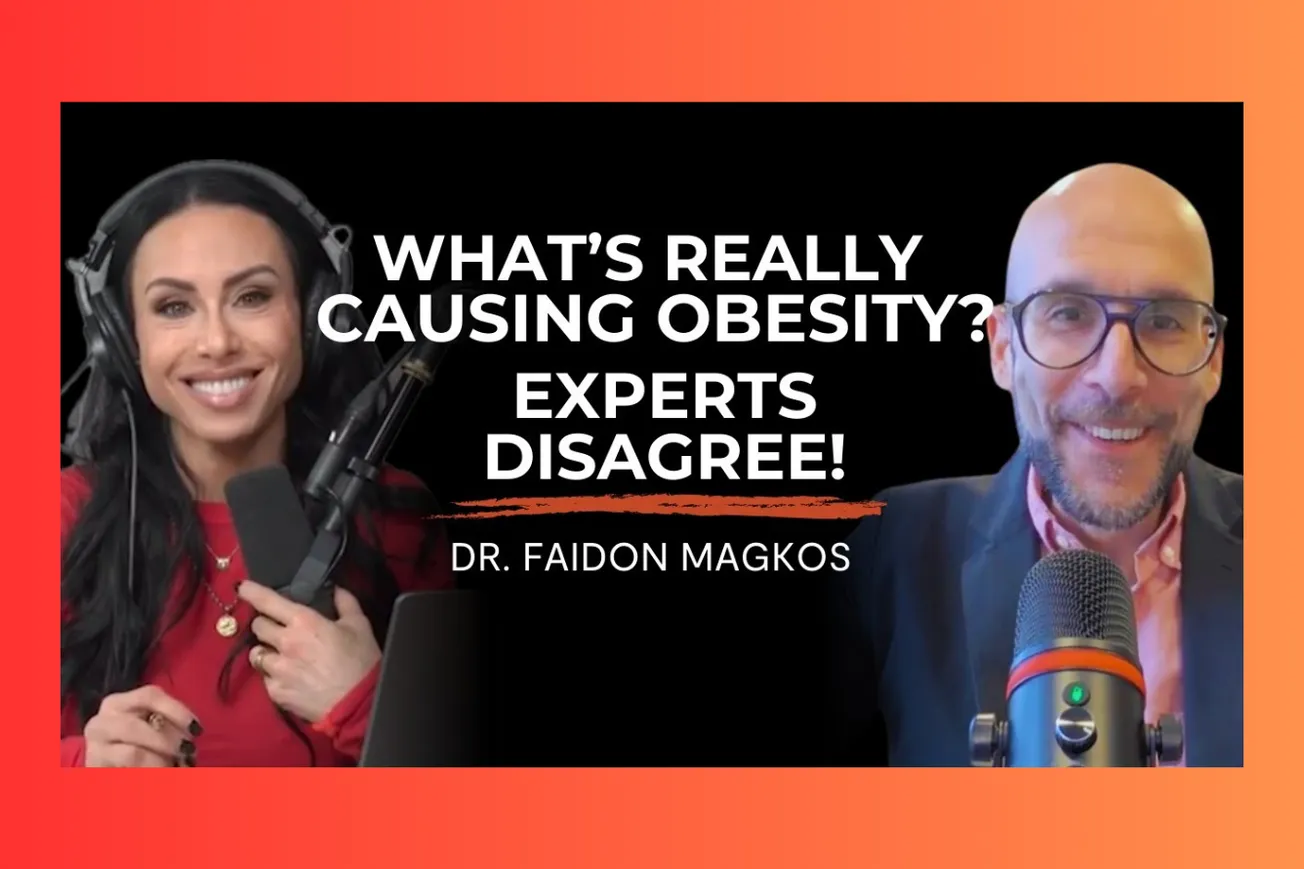Table of Contents
What if everything you thought you knew about weight gain was only half the story? A groundbreaking collaboration between competing obesity researchers reveals the shocking complexity behind what seems like a simple problem.
Key Takeaways
- Two primary models compete to explain obesity: energy balance (eat too much, gain weight) versus carbohydrate-insulin (metabolic dysfunction drives overeating)
- Even world-renowned obesity experts struggle to definitively prove which model is correct due to the limitations of human research
- Both models actually share more common ground than most people realize, particularly regarding the role of modern food environments
- The debate matters because it influences how we approach obesity treatment - from individual diet strategies to public health policies
- Multiple factors likely contribute to obesity simultaneously, including environmental contaminants, genetics, and metabolic variations between individuals
- Rapid initial weight loss may actually predict better long-term success, contrary to popular "slow and steady" wisdom
- Exercise and diet work synergistically - you can't "out-exercise" a bad diet, but you also can't "eat your way out" of being sedentary
- The location of fat storage matters more for health than total body weight, with visceral fat being particularly problematic
- Current research methods can't perfectly replicate real-world obesity development, making definitive conclusions nearly impossible
When the Experts Can't Agree
Here's something that might surprise you: the world's leading obesity researchers recently spent two days in Copenhagen trying to hash out their fundamental disagreements about what actually causes people to gain weight. And by the end? They're still not entirely sure.
Dr. Faidon Magkos, a professor at the University of Copenhagen and one of the most published researchers in metabolic science, led this ambitious effort. The result was a perspective paper published in Nature Metabolism that reads more like a diplomatic treaty than a typical scientific publication. Why? Because getting scientists with opposing viewpoints to agree on anything, even the wording of a single paragraph, turned out to be extraordinarily difficult.
The fact that we're still debating the fundamental causes of obesity tells you something important about the complexity of human metabolism. We're not talking about fringe theories here - these are legitimate scientific models supported by real evidence, each offering compelling explanations for why obesity rates have skyrocketed over the past several decades.
What makes this particularly fascinating is that both camps include heavyweight researchers. On one side, you have advocates for the traditional energy balance model. On the other, proponents of the newer carbohydrate-insulin hypothesis. And sitting in the middle, researchers like Magkos trying to find the common threads that might actually help us understand what's really going on.
The Energy Balance Story: It's All About the Math
The energy balance model is probably what you learned in school, assuming you learned anything about obesity at all. It's elegantly simple: if you eat more calories than you burn, you gain weight. If you eat fewer calories than you burn, you lose weight. The excess calories get stored as fat, mostly, though you'll also gain some muscle mass because your body needs extra strength to carry around the additional weight.
Think of it like a gas tank analogy. Normally, you put in 10 gallons every Monday, drive around all week, and by Sunday night you're empty. Perfect balance. But imagine the gas pump starts malfunctioning and gives you 11 gallons while showing 10. You're still driving the same amount, but now you're accumulating an extra gallon every week. Over time, that adds up.
In the obesity context, the "malfunctioning pump" is our modern food environment. Ultra-processed foods are energy-dense, hyper-palatable, and designed to override our natural satiety signals. They're packed with combinations of fat, salt, and sugar that don't exist in nature, delivered in portion sizes that would have been unimaginable to our great-grandparents.
The brain, according to this model, simply gets overwhelmed. It evolved to regulate food intake in an environment where calories were scarce and required significant effort to obtain. Now it's trying to manage intake in a world where 500-calorie donuts are available 24/7 at every gas station. The brain's appetite control systems, essentially, get hacked by food manufacturers.
What's particularly compelling about this model is how well it explains the obesity epidemic's timing. The dramatic rise in obesity rates corresponds closely with major changes in food processing, marketing, and availability. We're not eating fundamentally different foods so much as we're eating the same foods in radically different forms and quantities.
The Carbohydrate-Insulin Alternative: What If We've Got It Backwards?
But here's where things get interesting. The carbohydrate-insulin model suggests we might have the whole thing backwards. Instead of overeating leading to fat storage, what if fat storage is leading to overeating?
Picture this scenario: your body's metabolic machinery starts malfunctioning. Instead of efficiently using the calories you eat for energy, it starts shunting more of them directly into fat storage. Your muscles, liver, and other tissues can't access all the energy they need, even though you just ate. So your brain, quite logically, tells you to eat more.
Going back to the car analogy, imagine your fuel lines develop leaks. You put gas in the tank, but it can't all reach the engine. You have fuel in your car, but you can't use it effectively, so you're forced to fill up more frequently. The problem isn't that you're putting in too much gas - it's that your car can't properly utilize what you're giving it.
This model places the blame squarely on modern carbohydrate-rich foods, particularly those with high glycemic indexes and fructose-containing beverages. These foods, the theory goes, chronically elevate insulin levels and disrupt normal metabolic signaling. Your body becomes increasingly efficient at storing energy as fat while becoming increasingly inefficient at accessing that stored energy when needed.
The carbohydrate-insulin model also helps explain why simply reducing calories often fails long-term. If the underlying metabolic dysfunction isn't addressed, your body will continue trying to store excessive amounts of fat while leaving you feeling perpetually under-energized. This creates a biological drive to overeat that willpower alone can't overcome.
The Research Reality Check: Why We Can't Just "Prove It"
Here's the thing that's both frustrating and fascinating about this debate: we can't definitively prove either model correct using current research methods. And it's not for lack of trying.
The gold standard for testing these theories would be taking a large group of healthy, normal-weight people and following them for years or decades as they develop obesity, carefully controlling and monitoring everything they eat and do. Obviously, that's completely impossible for ethical and practical reasons.
Instead, researchers rely on overfeeding studies where they experimentally give people significantly more calories than they need for a few weeks. But here's the weird thing: when these studies end and people go home, most participants effortlessly lose the weight they gained, without even trying. This is completely different from real-world obesity, where people struggle tremendously to lose weight and keep it off.
The artificial nature of these studies creates a fundamental problem. Real obesity typically develops through eating just slightly more than you need - maybe 50-100 extra calories per day - over many years. The overfeeding studies use massive caloric surpluses for short periods. It's like trying to understand how rivers carve canyons by studying what happens when you dump a bucket of water on a rock.
Animal studies have their own limitations. Different species have completely different metabolisms, food preferences, and genetic makeups. What happens in a mouse or rat may have no bearing on human obesity whatsoever.
Even observational studies in humans are problematic. When researchers find correlations - like people who skip breakfast tend to weigh more - they can't determine cause and effect. Are people heavier because they skip breakfast, or do they skip breakfast because they're heavier and trying to compensate? When scientists actually test breakfast eating in controlled trials, the correlations often disappear entirely.
The Missing Pieces: What Neither Model Fully Explains
Both the energy balance and carbohydrate-insulin models focus primarily on food, but obesity likely has multiple contributing factors that neither addresses comprehensively.
Environmental contaminants represent one intriguing possibility. There's evidence suggesting that human basal metabolic rates have been declining for over 100 years, long before the emergence of modern processed foods. Pesticides, plastics, and industrial chemicals might be disrupting hormonal and metabolic function in ways we're only beginning to understand.
The story of the military commander's dog illustrates this perfectly. The animal gained massive amounts of weight over just two months without any change in food intake, apparently due to pesticide exposure from living near a golf course. The dog also lost vision in one eye, suggesting the chemicals were causing widespread physiological disruption.
Genetics obviously play a role too. Some people seem resistant to weight gain regardless of their diet, while others struggle with weight despite seemingly healthy lifestyles. These individual differences might mean that different obesity models apply to different people - some might be more susceptible to the energy balance pathway, while others are more vulnerable to metabolic dysfunction.
Viral infections, gut microbiome changes, stress, sleep disruption, medications, and aging all potentially contribute to obesity risk. The reality is probably that obesity results from a complex interaction of multiple factors, with different combinations being more relevant for different individuals.
What This Means for Actually Losing Weight
Despite all the scientific uncertainty, researchers do have practical insights for people trying to lose weight and improve their health.
First, the composition of weight loss matters more than just the number on the scale. When people lose weight, about 75% typically comes from fat and 25% from lean mass (which includes muscle, water, and other non-fat tissues). Rapid weight loss often gets criticized for causing more muscle loss, but here's something interesting: when researchers measure body composition after people have stabilized at their new lower weight, the differences between fast and slow weight loss largely disappear.
Even more surprising, people who lose weight rapidly in the first month or two of a diet program are actually more likely to maintain long-term weight loss success. This challenges the conventional wisdom that "slow and steady wins the race." The initial rapid loss seems to be biologically driven rather than just a matter of motivation, since everyone tends to be highly motivated in the early weeks of a diet.
Protein intake becomes increasingly important during weight loss and as we age. While someone maintaining their weight might do fine with 0.8 grams per kilogram of body weight (the minimum to prevent deficiency), people losing weight should aim for significantly more - potentially up to 2.2 grams per kilogram if they're trying to preserve muscle mass through exercise.
The percentage of calories from protein should increase as total calorie intake decreases. Someone eating 3,500 calories per day might get adequate protein from just 10% of their calories, but someone eating 1,200 calories for weight loss might need 25-30% of their calories from protein to meet their body's needs.
Exercise: The Great Equalizer
Regardless of which obesity model is correct, exercise appears beneficial for multiple reasons that go beyond simple calorie burning.
From a purely mathematical standpoint, exercise is somewhat disappointing for weight loss. An hour of running might burn 500 calories - about the same as a slice of pizza. But exercise's real value lies in its psychological and metabolic effects. People who exercise tend to make better food choices, feel more energetic, and enter what researchers call a "positive feedback loop" of healthy behaviors.
For aging and long-term health, resistance training becomes particularly important. While cardiovascular exercise burns more calories during the activity itself, strength training helps preserve muscle mass, which is crucial for maintaining metabolic rate and functional capacity as we get older.
The key insight is that you can't out-exercise a poor diet, but you also can't eat your way out of being sedentary. Both diet and exercise matter, and they work synergistically rather than independently.
The Location Problem: Why Where You Store Fat Matters More Than How Much
One of the most important developments in obesity research over the past few decades is the recognition that fat distribution matters more than total fat amount for health outcomes.
You can have someone with a BMI of 40 or 50 - meaning they're carrying 50+ kilograms of excess fat - who shows relatively few metabolic problems. Conversely, someone with normal total body weight might develop diabetes, heart disease, and other obesity-related conditions if they store even small amounts of fat in the wrong places.
Visceral fat (around the organs in your abdomen) and ectopic fat (stored in muscles, liver, or pancreas) seem particularly problematic. Just 200 grams of fat in the liver or 5 kilograms of visceral fat can cause more metabolic disruption than 50 kilograms of subcutaneous fat distributed around the body.
Why some people preferentially store fat in dangerous locations while others store it more safely isn't fully understood. Genetics clearly play a role, but so do diet, exercise habits, stress levels, and age. This helps explain why some people can be "metabolically healthy" despite obesity, though this appears to be a temporary state that becomes harder to maintain with age.
The Social Media Problem: When Complexity Meets Clickbait
One of the most frustrating aspects of obesity research, according to scientists like Magkos, is how their work gets interpreted and shared on social media. Complex, nuanced findings get reduced to absolute statements and used to support predetermined conclusions.
Single studies get treated as definitive proof rather than individual bricks in a larger scientific edifice. Cherry-picked results support whatever dietary trend is currently popular. And the fundamental uncertainty that's inherent to good science gets lost entirely in the rush to provide simple answers to complex questions.
The reality is that obesity research is still in its relative infancy. We're dealing with an incredibly complex biological system that evolved over millions of years, trying to understand how it responds to environmental changes that have occurred over just decades. The fact that we don't have all the answers yet doesn't mean the science is wrong - it means we're asking really hard questions.
The most honest answer to "What causes obesity?" might be "It's complicated, and it probably depends on the individual." That's not a satisfying answer for people looking for simple solutions, but it's probably the most accurate one we have right now.
The good news is that we do know quite a bit about what promotes overall health, regardless of the specific mechanisms involved. Eating mostly whole foods, getting regular physical activity, managing stress, and maintaining social connections all contribute to better health outcomes. These fundamentals work regardless of whether your particular obesity risk is driven by energy balance, metabolic dysfunction, or some combination of factors.
Maybe that's the real takeaway from this ongoing scientific debate. While researchers continue working to understand the precise mechanisms behind obesity, the rest of us can focus on the basics that everyone agrees actually matter for long-term health and wellbeing.





